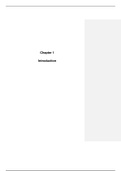Summary
Summary Complete Notes AP Psychology (thorough; help you get a 5)
Complete and detailed notes on Psychology 12 and AP Psychology. Partially annotated and well analyzed. Helps you easily get a 5. Split into 14 chapters for easy review.
[Show more]




